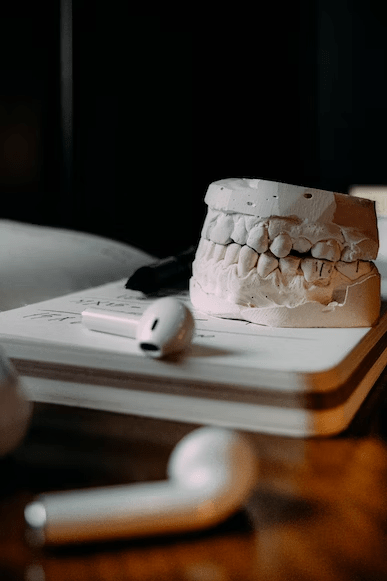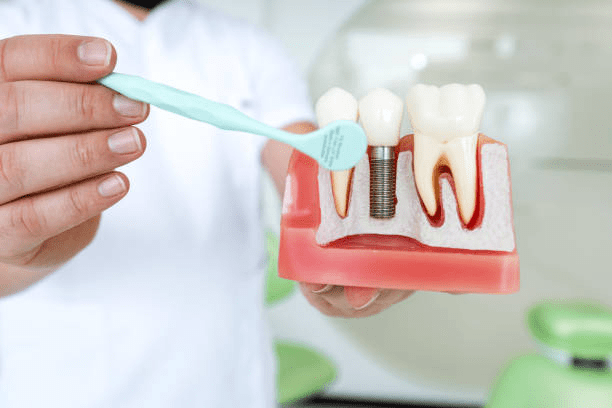
When considering dental implants as a solution for missing teeth, one common question that arises is, "How long do dental implants last?"
Dental implants have gained popularity as a durable and long-lasting option for tooth replacement. In this article, we will explore the lifespan of dental implants, their benefits, factors that affect their longevity, and more.
What is Dental Implant?
A dental implant is a small metal post that is carefully put into the jawbone to replace the root of a lost tooth. This titanium post serves as a strong base for the tooth implant, which is made to match the shape, size, and color of your real teeth.
People know dental implants for how long they last, how well they work, and how nice they look.
Why is it Important?
Maintaining a complete set of teeth is crucial for a confident smile and overall oral health. The surrounding teeth may shift when a tooth is lost, leading to misalignment and bite issues.
Additionally, the jawbone may start to deteriorate due to a lack of stimulation, causing facial sagging and further tooth loss. Dental implants provide a reliable solution that prevents these problems and offers a long-term replacement for missing teeth.
The Benefits Of Having Dental Implants
Dental implants offer numerous benefits, making them an excellent choice for tooth replacement. Let's explore some of the advantages of dental implants:
- Restored Confidence: Dental implants can transform your smile, boosting your self-esteem and restoring your confidence in social and professional settings.
- Improved Functionality: Unlike removable dentures, dental implants function like natural teeth, allowing you to eat your favorite foods without discomfort or restrictions.
- Enhanced Oral Health: Dental implants help maintain the integrity of your jawbone and neighboring teeth by preventing bone loss and tooth shifting.
- Longevity: With proper care, dental implants can last for many years, providing a long-lasting solution for missing teeth.
- Natural Appearance: The artificial tooth or crown attached to the implant is customized to match your natural teeth, ensuring a seamless and natural-looking smile.
- Convenience and Comfort: Dental implants eliminate the need for messy adhesives or removal for cleaning, providing a permanent and hassle-free tooth replacement option.
Dental Implant Procedure
If you know how tooth implants are put in, you'll have a better idea of how long they last and how well they work. Here's what usually happens:
Damaged Tooth Removal
A damaged or decayed tooth must first be removed to prepare for a dental implant replacement. You will be given a local anesthetic for this procedure.
Jawbone Preparation (Grafting)
The jawbone may need to be prepared in certain circumstances before an implant may be put there. Bone grafting, in which bone material is given to the jawbone to reinforce it and create a strong foundation for the implant, may be necessary at this stage.
Dental Implant Placement
Dental implants are surgically inserted into the jawbone after the bone has been prepped (if required). In place of the natural tooth's root, the implant anchors the prosthetic tooth firmly in place.
Bone Growth and Healing
The healing process starts immediately after the implant is inserted. The jawbone eventually heals around the implant, a process known as osseointegration. Thanks to its incorporation, the prosthetic tooth will have a sturdy and reliable base.
Abutment Placement
An abutment is fixed to the implant once it has fused with the jawbone. The prosthetic tooth or crown is secured to the abutment, a connection that extends above the gum line.
Artificial Tooth Placement
Finally, the artificial tooth or crown is attached to the abutment. This tooth is custom-designed to match your natural teeth' shape, size, and color, providing a seamless and natural-looking smile.
What Affects The Lifespan Of Dental Implants?
Several factors can influence the lifespan of dental implants. Understanding these factors will help you take the necessary steps to ensure the long-term success of your implants.
Oral Health
Dental implants will last longer if you take care of your teeth and gums well. By brushing your teeth at least twice a day, flossing often, and going to the dentist for regular checkups and cleanings, you can keep your gums and teeth healthy and reduce the chance of problems.
Lifestyle Choices
How you live your life can affect how long tooth implants last. For example, smoking can slow the mending process and make the implant more likely to fail. Stop smoking if you want your oral implants to last as long as possible.
Injury or Damage
Trauma or damage to the mouth can sometimes shorten the life of dental implants. Protecting your implants by having a mouthguard when you play sports or do other things that could hurt your oral health is important.
Medical Conditions
Dental implants may not work as well or last as long if you have diabetes or allergic disease. Talking to your doctor about your medical background is important to determine if tooth implant placement is possible.
Understanding the Costs of Dental Implants
When considering getting dental implants, knowing how much they will cost is important. The cost of dental implants can change based on a number of things, such as the amount of implants needed, any extra treatments, such as bone grafts, and the location of the dentist's office.
You should talk to your dentist for a personalized treatment plan and a good idea of how much it will cost.
Insurance and Payment Plans
Some dental insurance policies may cover a portion of the cost of dental implants.
Dental implant coverage varies widely by insurance company, so it's best to double-check with yours. Many dental offices also provide convenient financing options to help spread out the cost of treatment.
Maintenance of Dental Implants
Dental implants may last a lifetime with the right care. Important guidelines for maintaining your implants:
Daily Cleaning
Brush your teeth at least twice a day using a soft-bristled toothbrush and non-abrasive toothpaste. Flossing should be done daily to remove plaque and food particles from hard-to-reach areas around the implants.
Regular Dental Check-ups and Cleaning
Schedule regular check-ups with your dentist to monitor the health of your dental implants. Professional dental cleanings will help remove plaque and tartar buildup, ensuring the long-term success of your implants.
How Long Do Dental Implants Last Compared to Other Dental Prosthetics?

While dental implants are renowned for their longevity, it is important to understand how they compare to other dental prosthetics in terms of durability and lifespan. Let's explore a few common dental prosthetics and their average lifespan:
Dental Bridges
Traditional dental bridges typically last between 10 and 15 years with proper care. However, they may require replacement or repair over time due to wear and tear.
Dentures
Traditional removable dentures have a life expectancy of 5 to 8 years, depending on the individual. Dentures that are secured to implants are far more secure and may endure for 15 years or more.
Veneers
Dental veneers are thin shells bonded to the front surface of teeth to improve their appearance. With proper care, veneers can last anywhere from 10 to 15 years.
Dental Implants
Dental implants have a stellar reputation for lasting for decades. Dental implants, if well cared for, have the potential to last a lifetime.
Reasons Why You Need an Implant

There are several reasons why dental implants may be necessary. Common dental issues that may require implant placement include:
- Cavities: When cavities get too large for fillings or root canal treatment to save the tooth, the tooth may need to be extracted and replaced with an implant.
- Periodontal Issues: Loss of teeth may result from advanced gum disease. Dental implants are a permanent and solid option for these situations.
When to Get a Dental Implant
The best timing to obtain a dental implant varies from patient to patient and situation to situation. Dental implants may be implanted in certain patients immediately after teeth are removed to preserve bone and jaw structure.
However, dental implants might still be possible for those lacking teeth for some time. Dental professionals are the ideal people to contact when deciding whether to get implants.
Dental Implant at Mountain View Dental
At Mountain View Dental, we are committed to providing exceptional care and expertise when it comes to dental implants.
Our experienced team of dentists specializes in implant dentistry and is dedicated to helping you achieve a healthy, confident smile.
We offer personalized treatment plans tailored to your unique needs and goals using state-of-the-art technology and a patient-centered approach.
If you are considering dental implants or have any questions, we invite you to schedule a consultation with Mountain View Dental today. Let us help you restore your smile and enjoy the long-lasting benefits of dental implants!
Conclusion

Dental implants, in conclusion, are a long-lasting and reliable replacement for lost teeth. If taken care of, dental implants may replace missing teeth for the rest of your life, giving you a beautiful, permanent smile.
Understanding the process of getting dental implants, what variables determine their lifetime, and how they stack up against other dental prostheses can help you make a well-informed choice about whether or not to have them. Dental implants are an investment in your long-term oral health and happiness, not simply your smile.
So, with dental implants, take the initial step toward a brighter future and get the benefits for years to come.
